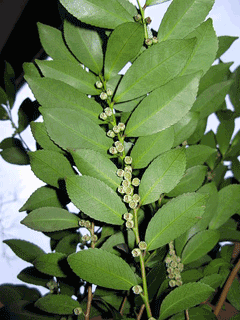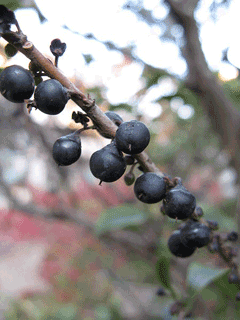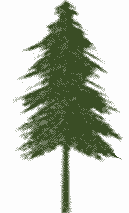 |
|
http://commons.wikimedia.org/wiki/User:Qwert1234 |
 |
| http://commons.wikimedia.org/wiki/User:KENPEI |
Translate this page:
Summary
Physical Characteristics

 Eurya japonica is an evergreen Tree growing to 3 m (9ft) by 3 m (9ft).
Eurya japonica is an evergreen Tree growing to 3 m (9ft) by 3 m (9ft).
See above for USDA hardiness. It is hardy to UK zone 9 and is frost tender. It is in leaf all year, in flower in May, and the seeds ripen in October. The species is hermaphrodite (has both male and female organs).
Suitable for: light (sandy), medium (loamy) and heavy (clay) soils and prefers well-drained soil. Suitable pH: mildly acid, neutral and basic (mildly alkaline) soils. It can grow in semi-shade (light woodland) or no shade. It prefers moist soil.
UK Hardiness Map
US Hardiness Map
Synonyms
E. ceylanica. Wight. E. pusilla.
Plant Habitats
Woodland Garden Sunny Edge; Dappled Shade; Shady Edge;
Edible Uses
Edible Parts:
Edible Uses: Tea
The leaves are used as a tea substitute or to adulterate China tea[183].
References More on Edible Uses
Medicinal Uses
Plants For A Future can not take any responsibility for any adverse effects from the use of plants. Always seek advice from a professional before using a plant medicinally.
None known
References More on Medicinal Uses
The Bookshop: Edible Plant Books
Our Latest books on Perennial Plants For Food Forests and Permaculture Gardens in paperback or digital formats.

Edible Tropical Plants
Food Forest Plants for Hotter Conditions: 250+ Plants For Tropical Food Forests & Permaculture Gardens.
More

Edible Temperate Plants
Plants for Your Food Forest: 500 Plants for Temperate Food Forests & Permaculture Gardens.
More

More Books
PFAF have eight books available in paperback and digital formats. Browse the shop for more information.
Shop Now
Other Uses
Fuel Wood
Wood - soft, close grained. Used mainly as a fuel[146].
Special Uses
References More on Other Uses
Cultivation details
Prefers a moderately fertile free-draining moisture retentive soil in sun or part shade with shelter from cold drying winds[200]. Probably best grown in a well-drained lime-free humus-rich soil[182]. Plants grow much taller in the milder areas of Britain[182]. Protect plants from frost when they are young[200]. The dwarf form that is grown in Britain is quite hardy once it is established[11]. The flowers are malodorous[200]. The trees are pollarded in the Himalayas and the leaves used for leaf manure[146]. Dioecious, male and female plants must be grown if seed is required.
References Carbon Farming Information and Carbon Sequestration Information
Temperature Converter
Type a value in the Celsius field to convert the value to Fahrenheit:
Fahrenheit:
The PFAF Bookshop
Plants For A Future have a number of books available in paperback and digital form. Book titles include Edible Plants, Edible Perennials, Edible Trees,Edible Shrubs, Woodland Gardening, and Temperate Food Forest Plants. Our new book is Food Forest Plants For Hotter Conditions (Tropical and Sub-Tropical).
Shop Now
Plant Propagation
Seed - sow as soon as it is ripe in a cold frame or sow in early spring in a greenhouse[200]. When they are large enough to handle, prick the seedlings out into individual pots and grow them on in the greenhouse for at least their first winter. Plant them out into their permanent positions in late spring or early summer, after the last expected frosts. Cuttings of half-ripe wood, 6 - 8cm with a slight heel, July/August in individual pots in a frame. High percentage[78].
Other Names
If available other names are mentioned here
Native Range
TEMPERATE ASIA: China, Japan (Honshu, Kyushu, Ryukyu Islands, Shikoku), Korea, South, Taiwan TROPICAL ASIA: India, Malaysia
Weed Potential
Right plant wrong place. We are currently updating this section.
Please note that a plant may be invasive in one area but may not in your area so it's worth checking.
Conservation Status
IUCN Red List of Threatened Plants Status :

Growth: S = slow M = medium F = fast. Soil: L = light (sandy) M = medium H = heavy (clay). pH: A = acid N = neutral B = basic (alkaline). Shade: F = full shade S = semi-shade N = no shade. Moisture: D = dry M = Moist We = wet Wa = water.
Now available:
Food Forest Plants for Mediterranean Conditions
350+ Perennial Plants For Mediterranean and Drier Food Forests and Permaculture Gardens.
[Paperback and eBook]
This is the third in Plants For A Future's series of plant guides for food forests tailored to
specific climate zones. Following volumes on temperate and tropical ecosystems, this book focuses
on species suited to Mediterranean conditions—regions with hot, dry summers and cool, wet winters,
often facing the added challenge of climate change.
Read More
Expert comment
Author
Thunb.
Botanical References
11200266
Links / References
For a list of references used on this page please go here
Readers comment
| Add a comment |
|
If you have important information about this plant that may help other users please add a comment or link below. Only comments or links that are felt to be directly relevant to a plant will be included. If you think a comment/link or information contained on this page is inaccurate or misleading we would welcome your feedback at [email protected]. If you have questions about a plant please use the Forum on this website as we do not have the resources to answer questions ourselves.
* Please note: the comments by website users are not necessarily those held by PFAF and may give misleading or inaccurate information.
To leave a comment please Register or login here All comments need to be approved so will not appear immediately.
|
|